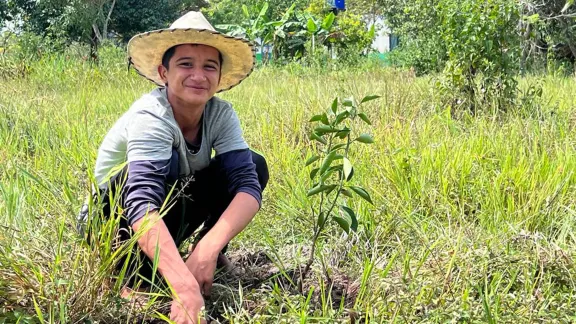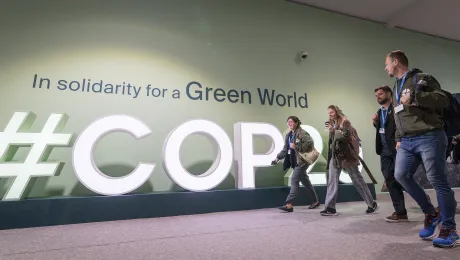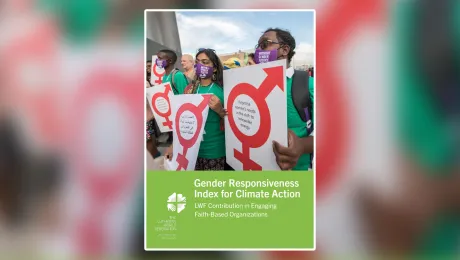
In der Region Arauca in Kolumbien, in der die Rohstoffindustrien ganze Ökosysteme verwüstet haben, nehmen örtliche Landwirtschaftsbetriebe an vom LWB unterstützten Projekten für Wiederaufforstung und Landgewinnung teil. Foto: LWB Kolumbien
LWB, ACT und ÖRK veröffentlichen gemeinsame Erklärung im Anschluss an die COP16 in Kolumbien
(LWI) – Der Lutherische Weltbund (LWB) hat gemeinsam mit seinen ökumenischen Partnern Regierungen weltweit aufgefordert, etwas gegen den Verlust der Artenvielfalt und den Klimawandel zu unternehmen – beide Krisen sind eng miteinander verbunden.
In einer gemeinsamen Erklärung im Anschluss an die 16. Konferenz der Vertragsparteien des Übereinkommens der Vereinten Nationen über die biologische Vielfalt (COP16) in Cali, Kolumbien, vom 21. Oktober bis zum 1. November haben der LWB, die ACT Alliance und der Ökumenische Rat der Kirchen (ÖRK) „konkrete Maßnahmen zur Wiederherstellung unserer Beziehungen zur Natur und zu den anderen Lebewesen, mit denen wir gemeinsam auf diesem Planeten leben“, gefordert.
Der LWB und seine Partner haben ihre gemeinsame Verpflichtung bekräftigt, „eine entscheidende Rolle beim Schutz der Artenvielfalt und der Gesundheit unseres Planeten zu übernehmen“, und auf die ebenso wichtige Aufgabe hingewiesen, inmitten einer Klimakrise zu handeln, „die unsere Ökosysteme verwüstet.“
Nathaly Quito von der Evangelisch-Lutherischen Kirche Kolumbiens (IELCO) hat den LWB auf der COP16 vertreten. Sie wies besonders auf die Bedeutung gemeinsamer Aktionen mit indigenen Völkern hin, die das Wissen ihrer Vorfahren in diese Projekte einbringen können. Wichtig sind hier auch die Führungskompetenzen von Frauen in Umweltschutzprogrammen und die Mitwirkung von Kindern und jungen Menschen als Fürsprecher der Natur. „Diese Synergie ermöglicht eine faire und gerechte Verteilung der Aufgaben, die zur Bewältigung der Klimakrise zu übernehmen sind“, sagte sie.
Der LWB, die ACT Alliance und der ÖRK fordern die Regierungen weltweit auf, mit diesen Gruppen einen inklusiven Dialog zu führen und ihnen auf Augenhöhe zu begegnen, denn „ihre Führungskompetenz ist entscheidend für den Erhalt des Lebens auf unserem Planeten.“
Die ökumenischen Partner haben ebenfalls die Bedeutung finanzieller Zusagen besonders aus der entwickelten Welt als Maßnahmen gegen diese Krise hervorgehoben. Sie fordern umfassendere finanzielle Unterstützung zum Schutz der Artenvielfalt und gegen den Klimawandel und setzen sich dafür ein, dass alle Länder integrierte Nationale Biodiversitätsstrategien und Aktionspläne (NBSAPs) vorlegen, die Klimarisiken benennen und auf Defizite hinweisen, die sich negativ auf ihre Ökosysteme und die Artenvielfalt auswirken.


